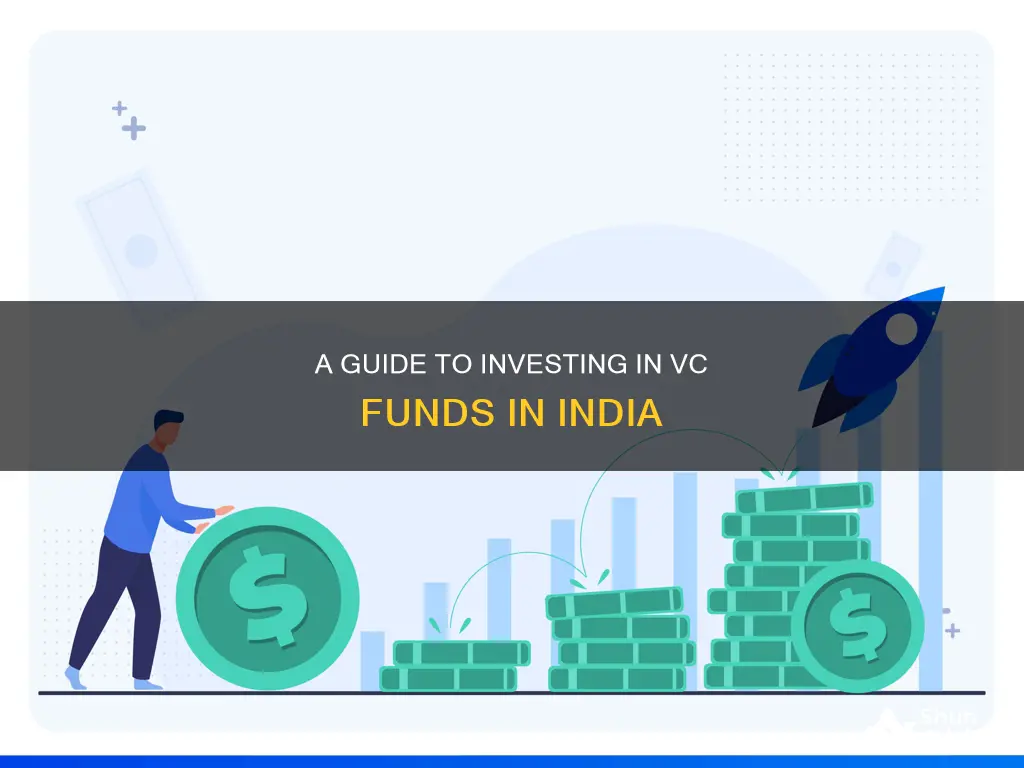
Venture capital funds (VCFs) are a type of investment fund that provides capital to startups and small businesses in exchange for equity. They are often high-risk investments, but if the business is successful, they can lead to lucrative returns. In India, VCFs have played a critical role in boosting the economy and fostering innovation, with the total funding raised by Indian startups in 2021 reaching a record $42 billion across 1,583 deals.
VCFs are typically managed by venture capital firms, which act as fund managers and investors. These firms identify investment areas with high growth potential and may also invest their own money. They usually seek a seat on the company's board of directors and offer expertise in management and business operations.
Investing in VCFs in India can be a complex process, and it is generally not available to the general public. However, individuals with high net worth, companies, or investment firms can participate in VCFs by approaching and convincing venture capital firms of their investment potential.
| Characteristics | Values |
|---|---|
| Type of Investment Fund | Investment in newly-formed start-ups and small to medium-sized companies |
| Management | Managed by a venture capital firm |
| Investor Profile | Individuals with high net worth, companies, or other funds |
| Investment Strategy | Targets firms with high growth potential and ability to generate high ROI |
| Risk Profile | High-risk investment due to focus on new ventures |
| Investment Approach | Invests in multiple companies to diversify risk |
| Role of Venture Capital Firm | Identifies investment areas, acts as fund manager and investor |
| Investment Stages | Seed funding, start-up funding, first-stage funding, expansion funding, acquisition or buyout funding |
| Benefits | No obligation for repayment, network and connection-building, business expansion, business expertise |
| Challenges | Time-consuming to secure funding, loss of control and ownership, highly competitive |
| Examples in India | Helion Venture Partners, Sequoia Capital India, Nexus Venture Capital |
What You'll Learn

The pros and cons of VC funding
Venture capital (VC) funding is one of the most well-known financing options for startups of all sizes. However, despite its fame, very few startups ever use VC funding. According to Forbes, only 1% or fewer startups use VC funding at any point in their growth journey.
VC funding offers a range of advantages that make it an attractive choice for startups seeking capital infusion. Here are some of the key pros of VC funding:
- Access to substantial capital: VC funding rounds can be in the tens or hundreds of millions of dollars, providing startups with the necessary capital to accelerate growth without worrying about running out of money.
- Opportunity for a strategic partnership: Venture capitalists bring expertise and connections to the table, in addition to capital. This provides an excellent opportunity to forge a partnership with someone who could help make intelligent business decisions.
- No obligations for repayment: One of the primary advantages of VC funding is that there is no obligation to repay the investment sum, even if the company fails. This is usually a severe problem in the case of bank loans.
- Beneficial for creating networks and connections: Venture capitalists have widespread networks that can help startups get the marketing and promotion they need to establish themselves.
- Paves the way for expansion: VC funding can help a company expand quickly and exponentially, which may not be possible with other types of funding.
- Offers crucial business expertise: Venture capitalists bring years of expertise to the table, which is crucial for young entrepreneurs who may lack experience in human resource management, financial management, and business decisions.
However, there are also several downsides to VC funding. Here are some of the main cons:
- Dilution of ownership and control: When founders give up ownership to venture capitalists in exchange for funding, they lose the final say in their company's major decisions. With each round of VC funding, they lose more control and introduce more people who influence the company's direction.
- Unrealistic growth and valuation pressure: Venture capitalists often want to receive a very high return on their investment, which can set the stage for intense and unsustainable pressure on startups to meet lofty expectations of rapid growth.
- Stringent requirements and time-consuming approval process: VC funding demands a rigorous due diligence process that involves extensive documentation, financial disclosures, and meticulous scrutiny of the startup's operations. Even getting a meeting with a VC can be challenging, and the entire process can take months, diverting resources and attention from other critical business functions.
- Securing funding can take a long time: Venture capitalists have to assess whether investing in a company will be feasible and can help generate favourable returns, which can delay funding.
- Forfeiture of complete control and ownership: By investing in a company, venture capitalists become part of its decision-making process and often hold a seat on the board.
- Can be challenging to secure: Due to the ever-growing number of startups, securing VC funding may be highly competitive.
Index Funds in Australia: Best Investment Options
You may want to see also

How to approach a VC firm
When approaching a VC firm, it is essential to understand how VC funding works and what VC firms look for in potential investments. Here are some key considerations and steps to approach a VC firm effectively:
- Understand the role of VC firms: VC firms act as fund managers and investors. They invest in companies with high growth potential and the ability to generate significant returns. A VC firm will typically invest in multiple companies simultaneously, as it diversifies risk and increases the chances of successful outcomes.
- Conduct market research: Identify VC firms that have a focus on your specific industry or sector. For example, if you are starting an e-wallet company, target investors who have experience in the fintech or financial sectors.
- Perform due diligence on VC firms: Evaluate the VC firm's track record, experience, and approach to startups and investments. Look into their portfolio companies, the strategies they employ, and the terms and conditions they offer. This information will help you determine if the VC firm is a good fit for your startup.
- Prepare a strong business pitch: Craft a clear, concise, and impactful pitch that highlights the unique aspects of your business idea. Ensure your pitch is supported by data, information, and documents. Practice your pitch to make it engaging and confident, whether you have 30 seconds or 30 minutes with the investor.
- Network and build relationships: Utilise your network to connect with VC firms and investors. Attend industry events, conferences, and meetups to increase your chances of getting introduced to the right people. A warm introduction can go a long way in getting your foot in the door.
- Demonstrate zeal and conviction: VC firms invest in people as much as they invest in ideas. Show that you have the passion, endurance, and conviction to see your idea through. They want to back entrepreneurs who are committed to their vision and have the drive to succeed.
- Highlight the potential for high returns: VC firms are looking for investments with the potential for significant financial returns. Emphasise the growth prospects of your startup and how it can generate lucrative returns for investors. Provide data and metrics to support your claims.
- Be prepared for due diligence: When VC firms consider investing, they will conduct due diligence on your startup. They will evaluate your business idea, its potential for success, your strategy, and your ability to execute and generate profits. Be prepared to provide transparent and comprehensive information to instil confidence in potential investors.
Remember that approaching VC firms requires a well-thought-out strategy and a compelling business case. Do your research, network, and fine-tune your pitch to increase your chances of securing VC funding for your startup.
A Guide to Investing in Calvert Funds Wisely
You may want to see also

Stages of VC funding
Venture capital funds (VCFs) are investment instruments that allow individuals to invest in newly-formed start-ups and small to medium-sized companies. VCFs are divided based on the stage they invest in. Here are the stages of VC funding:
Early-Stage Financing
This is the initial stage of investment, which can be further divided into three substages:
- Seed financing is the first set of money given to the founder for establishing their startup.
- Startup financing is when the money is provided for the development of products and services.
- First-stage financing is required when a startup intends to expand its business operations.
Expansion Financing
This is the second stage, once the startup has utilized its seed funding and requires funds for expansion and marketing. This includes bridge financing, which is needed by a startup during an IPO (Initial Public Offering).
Acquisition or Buyout Financing
When a company needs funds to acquire another company or parts of a company, it is known as acquisition financing. A buyout financing is when a company seeks to acquire another company's particular product.
Series B, C, D, and E
These stages involve common funding sources such as venture capital funds, private equity/investment firms, mergers and acquisitions, and initial public offerings (IPOs). Series B is about proving the performance of the startup, while Series C indicates that the company is on a growth path. Series D and beyond focus on late-stage startups that have achieved significant milestones and are preparing for large-scale expansion or an exit event.
Invest HSA Funds: TD Ameritrade Guide
You may want to see also

The role of a venture capitalist
A venture capitalist (VC) is a private equity investor who provides capital to companies with high growth potential in exchange for an equity stake. They tend to invest in startup ventures or small companies that wish to expand but lack access to equity markets.
VCs usually make their investments after a startup has been generating revenue, rather than in its initial stage. They target firms that generate revenue and need more funding to commercialise their ideas. The VC fund will buy a stake in these firms, nurture their growth, and look to cash out with a strong return on investment.
Venture capitalists typically look for companies with a strong management team, a large potential market, and a distinctive product or service with a solid competitive advantage. They also seek prospects in industries with which they are familiar or have expertise, and they aim to buy a large percentage of the company so they can influence its direction.
- Associates: These individuals usually come to VC firms with experience in business consulting or finance and, sometimes, degrees in business. They analyse business models, industry trends, and sectors. They also work on a firm's portfolio and may introduce promising companies to upper management.
- Principals: A principal is a mid-level professional. They usually serve on the boards of portfolio companies and ensure they run smoothly. Principals are also responsible for identifying prospects for VC firms and negotiating terms for acquisition and exit. They are on a "partner track" that depends on the returns they generate.
- Partners: Higher-profile partners primarily identify areas or specific businesses to invest in, approve deals (investments or exits), occasionally sit on the board of portfolio companies, and represent their VC firms.
Venture capitalists must follow regulations in conducting their business. In the US, for example, the Securities and Exchange Commission (SEC) regulates private equity firms and venture capitalists.
Saudi Wealth Fund: Where is it Invested?
You may want to see also

How to secure VC funding
Venture capital (VC) funding is a crucial source of money for startups in India, especially as they scale their operations and expand. Here are some steps and strategies to secure VC funding:
Understanding VC Funding
First, it is important to understand how VC funding works. Venture capital is a type of private equity where VC firms or funds provide financing to small, early-stage, or emerging startups with high growth potential in exchange for equity or ownership stake. VC firms take on the risk of investing in risky startups, hoping for substantial returns if the companies succeed. VC funding is typically not meant to be long-term, as the goal is to nurture the startup until it can be sold to a larger corporation or go public.
Choosing the Right VC Firm
Selecting the right VC firm is crucial. Entrepreneurs should conduct market research and look for firms with expertise in their specific sector. The chosen VC firm should be able to provide the necessary mentorship and guidance to help the startup grow and navigate the competitive landscape. It is also essential to understand how VC firms work, including their investment strategies, portfolio creation, and involvement in the startup's business strategies.
Preparing a Strong Pitch
To secure VC funding, entrepreneurs need to convince investors about the potential of their business. This involves creating a compelling and well-structured pitch deck that outlines the business plan, growth path, financial projections, unique selling points, and target market. The pitch should showcase the startup's potential for high growth and returns, as well as the entrepreneur's passion and vision.
Timing the Approach
Once the pitch is ready, the next step is to approach the analysts and associates of the targeted VC firms. The goal is to persuade them to fix a meeting with the general partners (GPs) or decision-makers. This requires a well-crafted and tailored pitch that highlights the strengths and potential of the startup.
Due Diligence and Finalisation
After the pitch, VC firms will typically conduct due diligence, evaluating the startup's financial decisions, team credentials, and market position. If the due diligence is successful, the funding process moves forward, and the deal is finalised on mutually agreed-upon terms. A term sheet is created, outlining the key provisions of the deal, including valuation, investment structure, management structure, and share capital changes.
Post-Funding Considerations
Even after securing VC funding, entrepreneurs need to be cautious about information sharing. As VC investors gain equity and a say in business decisions, sensitive information should be protected to avoid potential harm to the startup's growth and market position. Additionally, entrepreneurs should be prepared for the challenges that come with VC funding, such as meeting growth targets, maintaining autonomy in decision-making, and managing relationships with investors.
A Beginner's Guide to Mutual Fund Investing
You may want to see also
Frequently asked questions
A Venture Capital Fund, or VCF, is a type of investment fund that investors provide to homegrown or foreign startups that have long-term growth potential. This type of financing is often undertaken by strong investors, investment banks, or high-net-worth individuals.
VCFs offer business expertise, additional resources and connections, business expansion, and better management. They also provide seed funding and expansion-stage financing, helping small businesses scale up and grow economically.
The entrepreneur needs to shortlist a VCF whose expertise lies in their company's sector. It is important to research the VCF's investment thesis, which includes their preferred sectors, stage of the startup, and funding amount.
The entrepreneur must assess the need for funding, prepare a pitch deck, and approach analysts and associates of the VCF to present their business plans and projections. It is crucial to practice healthy caution when explaining the business idea to avoid potential leaks if the deal does not materialize.
The stages of Venture Capital Funding include the pre-seed stage, seed stage, Series A Funding, Series B Funding, and Series C Funding. Each stage involves different milestones and funding requirements, with VCs typically getting involved from the seed stage onwards.







